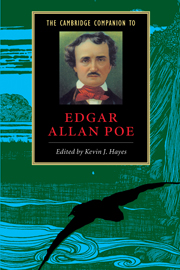Book contents
- Frontmatter
- Introduction
- 1 The poet as critic
- 2 Poe and his circle
- 3 Poe’s aesthetic theory
- 4 Poe’s humor
- 5 Poe and the Gothic tradition
- 6 Poe, sensationalism, and slavery
- 7 Extra! Extra! Poe invents science fiction!
- 8 Poe’s Dupin and the power of detection
- 9 Poe’s feminine ideal
- 10 A confused beginning
- 11 Poe’s “constructiveness” and “The Fall of the House of Usher”
- 12 Two verse masterworks
- 13 Poe and popular culture
- 14 One-man modernist
- Select bibliography
- Index
Introduction
Published online by Cambridge University Press: 28 May 2006
- Frontmatter
- Introduction
- 1 The poet as critic
- 2 Poe and his circle
- 3 Poe’s aesthetic theory
- 4 Poe’s humor
- 5 Poe and the Gothic tradition
- 6 Poe, sensationalism, and slavery
- 7 Extra! Extra! Poe invents science fiction!
- 8 Poe’s Dupin and the power of detection
- 9 Poe’s feminine ideal
- 10 A confused beginning
- 11 Poe’s “constructiveness” and “The Fall of the House of Usher”
- 12 Two verse masterworks
- 13 Poe and popular culture
- 14 One-man modernist
- Select bibliography
- Index
Summary
On 1 January 1875, William M. Cash, an Alexandria, Louisiana news carrier, had a special New Year's Day gift for the customers on his paper route: he presented each with The Bells, a handsome, eight-page pamphlet reprinting the well-known poem by Edgar Allan Poe. Louisiana newspaper subscribers were not the only people to receive copies of The Bells as presents during the 1870s. In Philadelphia, a china and glassware retailer issued a complimentary edition of the poem for its customers during Christmas time, 1872, and the week after Christmas, grocery boys in the employ of Philadelphia grocer, Mitchell and Fletcher, gave copies of The Bells to their customers as New Year's Day presents. Since bells had been a commonplace holiday motif for centuries, perhaps it should come as no surprise that copies of The Bells were being distributed to Philadelphia grocery shoppers or Louisiana newspaper subscribers. Anyone who believed what they read in the literary periodicals of the day, however, would hardly find Poe's writings suitable material to pass through the hands of impressionable young news carriers and grocery boys.
- Type
- Chapter
- Information
- The Cambridge Companion to Edgar Allan Poe , pp. 1 - 6Publisher: Cambridge University PressPrint publication year: 2002

